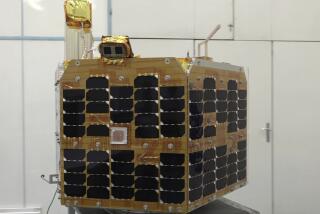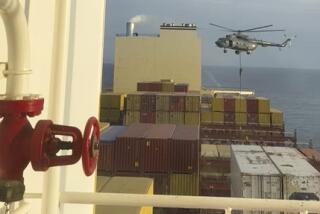Key Iraqi Island Captured in New Drive, Iran Claims
- Share via
AMMAN, Jordan — Iran said Thursday that its forces have captured a strategic Iraqi island in the early hours of its latest offensive in the six-year-old Persian Gulf War.
Iraqi communiques continued to insist that the Iranian attack has been “fully and completely defeated,” but there were indications that the fighting was still raging near Basra, Iraq’s second-largest city.
The official Iranian news agency quoted a military spokesman as saying that Iranian troops have crossed the Shatt al Arab waterway south of Basra and “infiltrated” four islands in the estuary that were formerly in Iraqi hands.
The largest of the islands, Umm al Rasas, was captured and heavy casualties were inflicted on the Iraqi defenders, the Iranian military spokesman said. The islands are linked to the Iraqi bank of the river by pontoon bridges and are relatively easy to cut off from reinforcements.
“The success of Iranian Muslim combatants in crossing (the waterway) and breaking through the fortified enemy positions around Umm al Rasas island was an astonishing move from the military point of view because the Iraqi forces never thought Iranian combatants could cross the river so swiftly and attack them,” the Iranian spokesman said.
The spokesman said the offensive, which was code named “Karbala 4” after a site in Iraq holy to Shia Muslims, was limited to a “destructive raid” that he said was in retaliation for recent Iraqi air raids against Iranian civilian centers.
The spokesman denied that the attack constituted the major offensive that Western military analysts have expected for the last several months. Iran has massed more than 500,000 troops along the border with Iraq in apparent anticipation of trying to end the costly conflict.
The Iraqis described the attack as a two-pronged offensive aimed at hitting Basra from the east and the south.
It said that Iranian forces in the Faw Peninsula, site of a former Iraqi oil terminal that was captured by Iran in February, have joined the advancing troops that came across the waterway.
At the time of the Faw offensive in February, Iraqi military communiques insisted for days after the event that Iraq’s forces had been victorious, but Iran proved its claims by escorting Western reporters to the captured territory.
During the Faw attack, Iranian forces also briefly captured Umm al Rasas, but that move was believed to have been a feint. The Iraqis recaptured the island within a day and fortified it heavily with tanks and artillery.
A communique issued in Baghdad on Thursday urged the Iraqi people “to be confident that victory will be ours and our armed forces will defeat the enemy. . . .”
In an illuminating remark, Lt. Gen. Maher Abed Rashid, the commander of Iraq’s 7th Army Corps, which is based south of Basra, was quoted as saying that his forces have seized the initiative with the help of the air force.
“Our corps forces are now encircling enemy troops and sealing off their escape,” he was quoted as saying, an apparent admission that a sizable enemy force had crossed into Iraqi territory and that the battle was far from over.
Claims Many Captives
The Iraqi news agency reported that large numbers of Iranian prisoners have been taken in the fighting and that they will be displayed to the public.
The capture of Basra would not necessarily be immediately fatal to the Iraqi government of President Saddam Hussein, but its loss would so undermine the credibility of the regime that many Western experts believe the government would not be able to survive the political consequences.
As if to emphasize the political dimension, the Iranians have simultaneously convened in Tehran a meeting of Iraqi opposition groups to discuss the future of their country after the war is over and, the groups maintain, Saddam Hussein is overthrown.
Strategy Uncertain
Western military analysts have been wondering whether Iran would attempt to launch a major offensive in the relatively wet December weather that prevails in the southern portions of Iraq.
On the one hand, it would inhibit the Iraqi ability to deploy tanks and armored vehicles, which they have in large numbers. But it would also make it difficult for the Iranians to maneuver and move vehicles of their own, such as artillery and supplies.
The Iraqis have constructed a modern-day version of the Maginot Line east of the Shatt al Arab waterway, composed of tanks and a massive dirt berm that stretches for dozens of miles.
Recent disclosures that the Iranians had purchased some 2,000 TOW anti-tank weapons from the United States suggested that Tehran was contemplating another land offensive involving an assault against Iraq’s superior armored forces.
More to Read
Sign up for Essential California
The most important California stories and recommendations in your inbox every morning.
You may occasionally receive promotional content from the Los Angeles Times.













